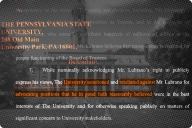You have /5 articles left.
Sign up for a free account or log in.
Economists make many assumptions in our efforts to mathematically model the world. Some of these assumptions instantly make sense to everyone. The idea that family members work together so as to maximize the welfare of the family unit is one such example. Other assumptions, however, require more of a leap of faith. For example, we often assume that lending markets are such that people can borrow against future income increases to pay for education. This assumption implies that a college student can easily borrow enough money to pay for their education, knowing that they can pay it back later with the increase in their income that the education brings. As most of us involved in higher education know well, especially in the current economic climate, this is far from true. However, it is often the case that strong assumptions must be made in order to move forward with a mathematical model of a particular situation.
One assumption that is often made in economics is the assumption that people have perfect foresight about their lifespan, and can thus plan accordingly. This assumption implies that people can save exactly enough money to be able to survive retirement, depleting it during that time and dying with exactly no money remaining, except for that amount they might want to leave to their heirs.
We obviously know that this is not the case. I know of several people near retirement who are suddenly rethinking their plans now that their retirement savings, tied to the stock market, are smaller than they thought they would be. In addition, it is common for people to die with money left in the bank, money that could have been used enjoying life while they were alive. While this assumption may not always make sense in reality, it provides me with an interesting reflection as we enter the New Year.
What does it mean to not know how long we are going to live? It means that every day is precious, and that we can no longer count on “tomorrows” to live out our dreams. It means that we don’t know if we will have time tomorrow to help our child put together a puzzle, to inspire our students to pursue an independent research project, or to write that paper that insists on residing in our subconscious. It means, as I learned when I battled and recovered from a life-threatening illness many years ago, that what one must be thankful for upon waking is not for the whole day (one never knows if one will make it through that day), but for the chance to live IN that day. And that each day (and year) is an incredible gift.
Long before I knew anything about Ursuline College, I essentially found myself living by the wise words of Angela Mericii, the founder of the Ursuline Sisters who run our school. Looking at every new day as a great gift, I was, without knowing it, living by her famous words, which I like to remember as we enter a new year. As she said, “Get moving...Be confident...Risk new things...Stick with it...Get on your knees...Then be ready for big surprises!”
And, so, as a New Year dawns, I am taking a moment to be thankful for being able to live IN this New Year. Despite what economists sometimes say, we don’t know how many more of these there will be. I hope that I will savor it and make the most of it.
Wishing everyone a Happy and productive New Year!





